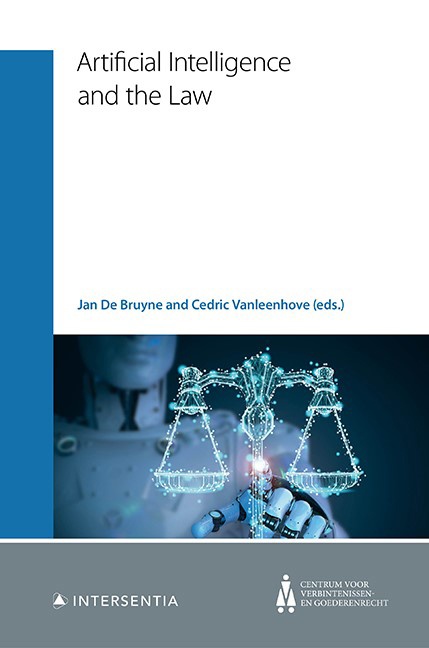Book contents
- Frontmatter
- Contents
- Foreword
- Contributing Authors
- Chapter 1 Basic Concepts of AI for Legal Scholars
- Chapter 2 Different Models of Innovation and Their Relation to Law
- Chapter 3 Setting the Scene: On AI Ethics and Regulation
- Chapter 4 Quantitative Legal Prediction: the Future of Dispute Resolution?
- Chapter 5 AI Arbitrators … ‘Does Not Compute’
- Chapter 6 AI through a Human Rights Lens. The Role of Human Rights in Fulfilling AI’s Potential
- Chapter 7 Killer Robots: Lethal Autonomous Weapons and International Law
- Chapter 8 AI and Data Protection: the Case of Smart Home Assistants
- Chapter 9 AI and IP: a Tale of Two Acronyms
- Chapter 10 Tax and Robots
- Chapter 11 Robotisation and Labour Law. The Dark Factory: the Dark Side of Work?
- Chapter 12 The Hypothesis of Technological Unemployment Caused by AI-Driven Automation and its Impact on Social Security Law
- Chapter 13 AI in Belgian Contract Law: Disruptive Challenge or Business as Usual?
- Chapter 14 Tort Law and Damage Caused by AI Systems
- Chapter 15 Insurance Underwriting on the Basis of Telematics: Segmentation and Profiling
- Chapter 16 AI and Creditworthiness Assessments: the Tale of Credit Scoring and Consumer Protection. A Story with a Happy Ending?
- Chapter 17 AI and the Consumer
- Chapter 18 Robots and AI in the Healthcare Sector: Potential Existing Legal Safeguards Against a(n) (Un)justified Fear for ‘Dehumanisation’ of the Physician-Patient Relationship
Chapter 5 - AI Arbitrators … ‘Does Not Compute’
Published online by Cambridge University Press: 26 May 2021
- Frontmatter
- Contents
- Foreword
- Contributing Authors
- Chapter 1 Basic Concepts of AI for Legal Scholars
- Chapter 2 Different Models of Innovation and Their Relation to Law
- Chapter 3 Setting the Scene: On AI Ethics and Regulation
- Chapter 4 Quantitative Legal Prediction: the Future of Dispute Resolution?
- Chapter 5 AI Arbitrators … ‘Does Not Compute’
- Chapter 6 AI through a Human Rights Lens. The Role of Human Rights in Fulfilling AI’s Potential
- Chapter 7 Killer Robots: Lethal Autonomous Weapons and International Law
- Chapter 8 AI and Data Protection: the Case of Smart Home Assistants
- Chapter 9 AI and IP: a Tale of Two Acronyms
- Chapter 10 Tax and Robots
- Chapter 11 Robotisation and Labour Law. The Dark Factory: the Dark Side of Work?
- Chapter 12 The Hypothesis of Technological Unemployment Caused by AI-Driven Automation and its Impact on Social Security Law
- Chapter 13 AI in Belgian Contract Law: Disruptive Challenge or Business as Usual?
- Chapter 14 Tort Law and Damage Caused by AI Systems
- Chapter 15 Insurance Underwriting on the Basis of Telematics: Segmentation and Profiling
- Chapter 16 AI and Creditworthiness Assessments: the Tale of Credit Scoring and Consumer Protection. A Story with a Happy Ending?
- Chapter 17 AI and the Consumer
- Chapter 18 Robots and AI in the Healthcare Sector: Potential Existing Legal Safeguards Against a(n) (Un)justified Fear for ‘Dehumanisation’ of the Physician-Patient Relationship
Summary
INTRODUCTION
1. Arbitration is a method of alternative dispute resolution in which parties give up their right to have a legal dispute decided by a state court. Instead, they agree to authorise a so-called arbitral tribunal (composed of ‘private’ arbitrators appointed by the parties) to decide their dispute by rendering a binding decision. The decisions of arbitral tribunals are called arbitral awards and can be enforced if necessary.
2. One of the main selling points of arbitration is that it allows the parties to tailor the procedure to the specific needs of their dispute. More so than is the case for proceedings before state courts, the flexibility of arbitral procedure allows for the elimination of unnecessary procedural steps, saving both time and cost.
Compared to the technological revolution of the last decades, however, arbitrations are still ‘conducted in substantially the same way as they were 50 years ago’. Of course, standard applications such as e-mail and telephone or video conferences are already routinely used. Briefs are also usually created and submitted electronically, and increasingly include hyperlink references to the file or hearing transcript. Even slightly more advanced processes (such as identification, collection and transmission of responsive documents for the purpose of document production) are now conducted electronically and sometimes even generate new questions (e.g. in relation to the metadata accompanying such ‘electronically stored information’ or ‘ESI’). Generally speaking, however, this cannot be considered a true revolution.
3. As far as revolutionary technologies go, the recent buzz surrounding artificial intelligence has leftfew areas of the law unaffected. International arbitration is no exception.
Indeed, AI-based applications can already provide support in many different ways throughout the course of a legal dispute. They can, for instance, assist in the analysis or even in the conclusion of contracts; they can help the parties in making strategic decisions based on data-analytics (such as which arbitrator to appoint); they can help counsel in the analysis and the drafting of submissions; and speedily process large amounts of data in electronic discovery.
- Type
- Chapter
- Information
- Artificial Intelligence and the Law , pp. 101 - 122Publisher: IntersentiaPrint publication year: 2021



